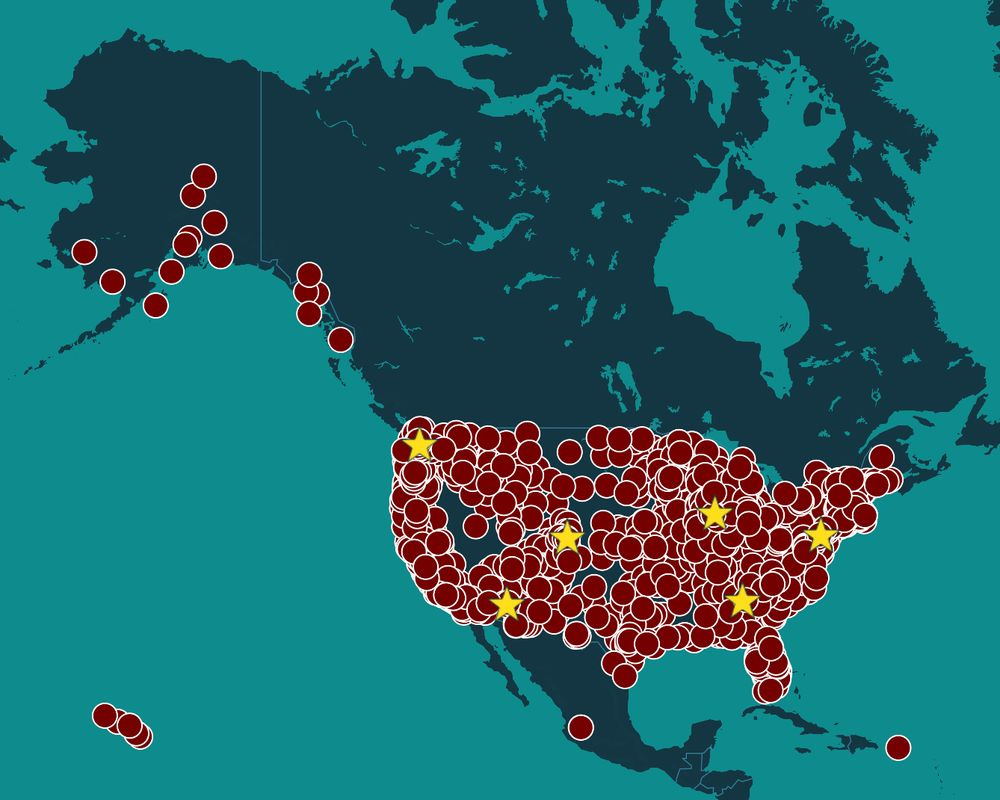A National Day of Action
Today, over a thousand protests take place nationwide come just after some big actions and setbacks for Trump, Musk, and Vought.
Today is a big day for protesters, who will gather all over the nation. It will be fun - you should go!
It's the nationwide "Hands Off!" Day of Action taking place at noon at over a thousand locations nationwide. If ever we were going to find out whether nonviolent protest has network effects, today’s the day.
In some ways, this is an auspicious time for the protests to happen. It's been an exceptionally bad week for Donald Trump, Elon Musk, and Russell Vought. In the parade of disasters, they are starting to shoot themselves in the foot.
If today’s protests as well as lawsuits and other acts of resistance succeed, then some of the very worst outcomes will be slowed down. This is not to say I'm expecting a good outcome. But it does appear that some constitutional roadblocks are holding.
Special elections reveal deepening anti-Republican feelings
This week's special elections turned out pretty much as expected based on what's been happening over the last few months. The April 1st election for the Wisconsin state Supreme Court had the potential to reverse that court's 4-3 progressive majority. But Susan Crawford, running against election denier Brad Schimel and his sponsor Elon Musk, won by 11 points. That overperformance almost exactly matches the overall performance of Democrats in special elections since the inauguration.
Crawford’s win guarantees a pro-voting-rights majority on the state Supreme Court for at least three more years. That's enough time for a congressional gerrymandering lawsuit to be heard under the state constitution, as well as a full set of elections to be held under the fair maps that the court facilitated last year. I don't know who will control Wisconsin's legislature in the near future, but I do know it is highly likely to be whichever party wins the support of a majority of Wisconsin voters.
An anti-voter saga continues in North Carolina
State courts are a pivot point for constitutional voting rights not only in Wisconsin but North Carolina. On Friday came very concerning news: a state Appeals court overturned Justice Allison Riggs's recent re-election to the state Supreme Court. The Appeals court invalidated 65,000 votes, potentially flipping the election to her challenger, Jefferson Griffin. By sending this case to the Court of Appeals first, North Carolina Chief Justice Paul Newby has engineered a situation in which his own court only needs to vote 3-3 to leave that ruling in place.
However, this is not the end of the story. The federal 4th Circuit Court previously reserved for itself the right to get involved in the Riggs-Griffin election in case the state courts leave any federal voting rights issues unresolved. One such constitutional principle is the concept that election rules should not be changed after an election has taken place. Changing the rules after the election constitutes an equal-protection violation. There's a good chance that Justice Riggs will eventually win, though it may take six months or longer.
America’s universities start to fight back
Last week, recall that my own school’s president, Christopher Eisgruber, made a firm statement that Princeton University would not cave to illegal attacks by the Trump administration. A number of us expressed strong support. This week, the Trump administration followed through, suspending grants to Princeton from the Departments of Defense and Energy, as well as NASA.
For some reason, they skipped NIH, a temporary blessing for those of us who do biomedical research. I suspect the geniuses at Project 2025 simply forgot about us. Since Princeton lacks a medical school, they may have thought there was nothing to cut. Remember, these are the same solons who have slapped a tariff on exports from islands populated only by penguins.
We're not at the end of the story. President Eisgruber said that the university is considering issuing taxable bonds to cover any near-term gap. Princeton has a large endowment, which pays for things like undergraduate scholarships and a variety of departments. But even Princeton does not have the resources to make up for the enormous amount of federal money that drives American discovery. The possibility of issuing bonds is a good sign that Princeton is ready to go the distance. Think of them as war bonds.
On top of all this, on Thursday former President Barack Obama spoke out in defense of universities. Like President Eisgruber and Wesleyan University’s president Michael Roth, Obama made a case that universities should stand up against the attacks from the federal government.
Finally, just like in other sectors such as politics and law, moral pressure on universities is coming from below. The Rutgers Faculty Senate called upon the Big Ten schools to band together and form a mutual defense fund. Scale is one way that universities can withstand the onslaught. The challenge is for people who are lower-down to exert enough collective pressure to get their higher-ups to show signs of life.
Chickens (or is it penguins?) come home to roost
On top of all this, Trump’s Wednesday announcement of draconian and random tariffs has sent world markets into freefall. These tariffs have no logical rationale, except for some naive formula cooked up by a DOGEr or an AI.
One particular casualty in the stock market was the principal source of Elon Musk’s wealth, Tesla. Tesla’s stock price has dropped by 15% since Wednesday.

Today it’s your turn
Speaking of collective action, Saturday April 5th is a National Day of Action. Today you have the opportunity to go to any one of a thousand protests around the nation. The nationwide action has the theme of "Hands Off!" Hands off our Medicare, Social Security, personal data, veterans' benefits, immigrants, cancer cures, scientific research, free speech, fair elections, schools, and libraries. Take your pick. It's a big coalition.
Find a protest near you and get out there. Cory Booker went at it for 25 hours this week; surely you can spare two hours of your time.





"If you ever wondered what you would have done in Germany in 1933, you’re doing it now."
My 3-time alma mater, the University of Michigan, has an annual budget of ~ $14+ billion and an endowment of $17 billion. It gets more than $2B annually in federal funds for research.
I'd like to think it could have held out against the demands of this autocratic/kakistocratic regime for a few years by tapping its endowment for some or all of the losses of federal money, but it appears what "I'd like to think" and what the U's leaders prefer to do are worlds apart. It chose to cave in to the administration's threats, specifically so far as to the U's DEI initiatives.
I'm glad to see Princeton has,, at least for now, the courage of its convictions, but I'm deeply disappointed in U-M.
Sources: U-M publications about its budget, endowment, and termination of its DEI programs.